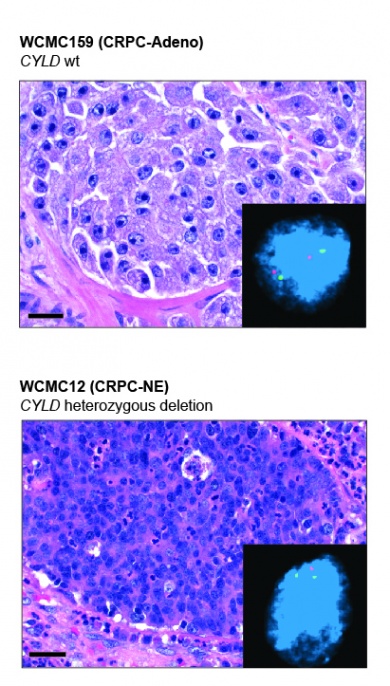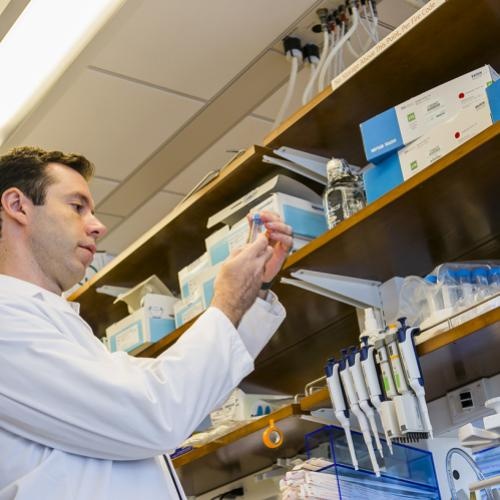Sequencing reveals molecular underpinnings of aggressive prostate cancer subtype
A subset of treatment-resistant prostate cancer pathologically resembles small cell lung cancer rather than typical prostate cancer, Weill Cornell Medicine and University of Trento investigators discovered in a new study. The scientists say their findings may lead to more effective ways to diagnose and treat neuroendocrine prostate cancer.
Therapies that cut off the hormone androgen, which fuels tumor growth, are commonly used to treat patients with advanced prostate cancer. While this is initially effective, patients often stop responding and develop treatment resistance. Some of these tumors transform from typical prostate cancer, called adenocarcinoma, into neuroendocrine prostate cancer — an event that scientists have increasingly observed but knew little about how or why it happened.
For their large study, published Feb. 8 in Nature Medicine, Weill Cornell Medicine investigators collaborated with scientists at the University of Trento. They used next-generation sequencing technologies to examine resistance across a spectrum of patients and discovered the genetic, epigenetic and molecular features that underlie neuroendocrine prostate cancer. Their findings illuminate the disease's distinctive characteristics, which may enable researchers to develop biomarkers to help identify this subset of patients with prostate cancer less likely to respond to the next line of hormonal-based therapies. This large dataset can now also be used by researchers to develop new therapeutic approaches for patients.
"We used genomics to better understand how neuroendocrine prostate tumors develop," said lead author Dr. Himisha Beltran, an assistant professor of medicine at Weill Cornell Medicine and director of clinical activities at its Caryl and Israel Englander Institute for Precision Medicine. "These tumors seem to arise clonally from a typical prostate cancer (adenocarcinoma) cell of origin."
Prostate cancer is the leading cause of male cancer death worldwide. The American Cancer Society estimated that 220,000 new cases of prostate cancer were diagnosed in the United States in 2015, and nearly 28,000 men died from the disease.
While patients with advanced prostate cancer typically respond well to initial and even subsequent hormonal therapies, understanding why patients stop responding can help identify new therapeutic options. Most commonly, tumors remain driven by androgen even during treatment resistance; only a small fraction of patients develop truly androgen-independent disease associated with neuroendocrine features, the investigators said. To discern these differences, scientists examined 114 metastatic tumor samples from 81 patients with resistant prostate cancer enrolled at the Englander Institute for Precision Medicine, including 30 patients with neuroendocrine prostate cancer.
"Usually patients only have one biopsy — the one that leads to a diagnosis — and no more. For this study, we examined cancers that had been rebiopsied after they spread to see how the tumors changed," said Dr. Beltran, who is also a member of the Sandra and Edward Meyer Cancer Center at Weill Cornell Medicine and an oncologist at NewYork-Presbyterian/Weill Cornell Medical Center.
The investigators first compared adenocarcinoma and neuroendocrine prostate cancer tumors under the microscope. The difference was stark: The neuroendocrine tumors looked pathologically different than the adenocarcinoma tumors, Dr. Beltran said. The investigators then sequenced the two tumor types to see if they were genetically and epigenetically the same.
"While the two resistant tumor types (adenocarcinoma and neuroendocrine prostate cancer) were genomically similar, they had distinct epigenomic profiles," said co-senior author Dr. Mark Rubin, director of the Englander Institute for Precision Medicine, the Homer T. Hirst III Professor of Oncology in Pathology and a member of the Meyer Cancer Center at Weill Cornell Medicine. "These changes could potentially explain why the altered cells no longer respond to anti-hormonal therapies."
The investigators found that the features of a person's tumor can evolve over time, and the tumor cells can acquire molecular changes affecting cancer-associated pathways.
"Neuroendocrine tumors evolved from adenocarcinomas, but they are being activated in different ways," said co- senior author Dr. Francesca Demichelis, an associate professor at the University of Trento and an adjunct professor of computational biomedicine in the Institute for Computational Biomedicine and a member of the Meyer Cancer Center at Weill Cornell Medicine, whose laboratory led the computational analyses for this study. "Because of this difference in activation, it may be possible to find new drug targets that can shut down these previously untreatable cells."
These findings may help scientists develop biomarkers to help predict which patients are developing this disease transformation. With that information, physicians may be able to diagnose the condition earlier and intervene with different therapeutic approaches.
"The goal of precision medicine — our goal — is to identify which therapies are most effective for an individual patient and to understand why some patients stop responding to the available therapies that we have," Dr. Beltran said. "This study identifies distinct molecular characteristics associated with neuroendocrine prostate cancer, one subset of treatment resistant prostate cancer. This study is an excellent example of current collaborative and multidisciplinary team science, and the results of this effort between Weill Cornell Medicine, University of Trento, and the Broad Institute, will serve as an important resource for future research focused on how to more effectively treat patients that have developed this aggressive subtype."
"The Prostate Cancer Foundation applauds the work of Dr. Beltran and colleagues in understanding genomic alterations for patients with severe treatment resistance," said Dr. Howard R. Soule, chief science officer of the foundation. "This work addresses a significant unmet medical need and may ultimately result in improved disease control."









